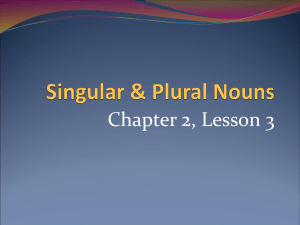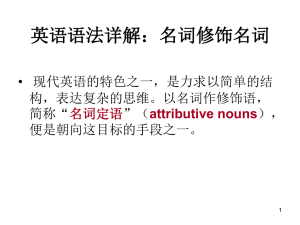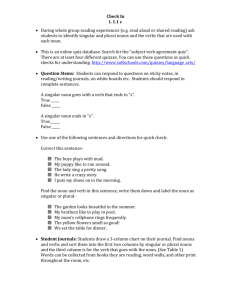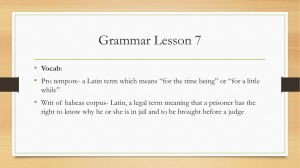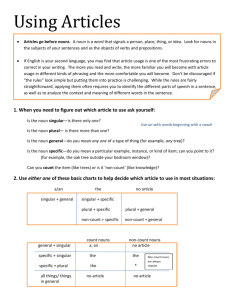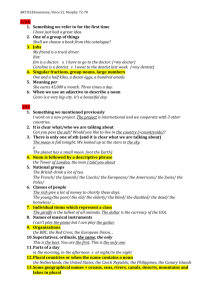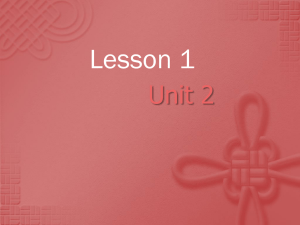SINGULAR OR PLURAL – SPECIAL CASES
advertisement
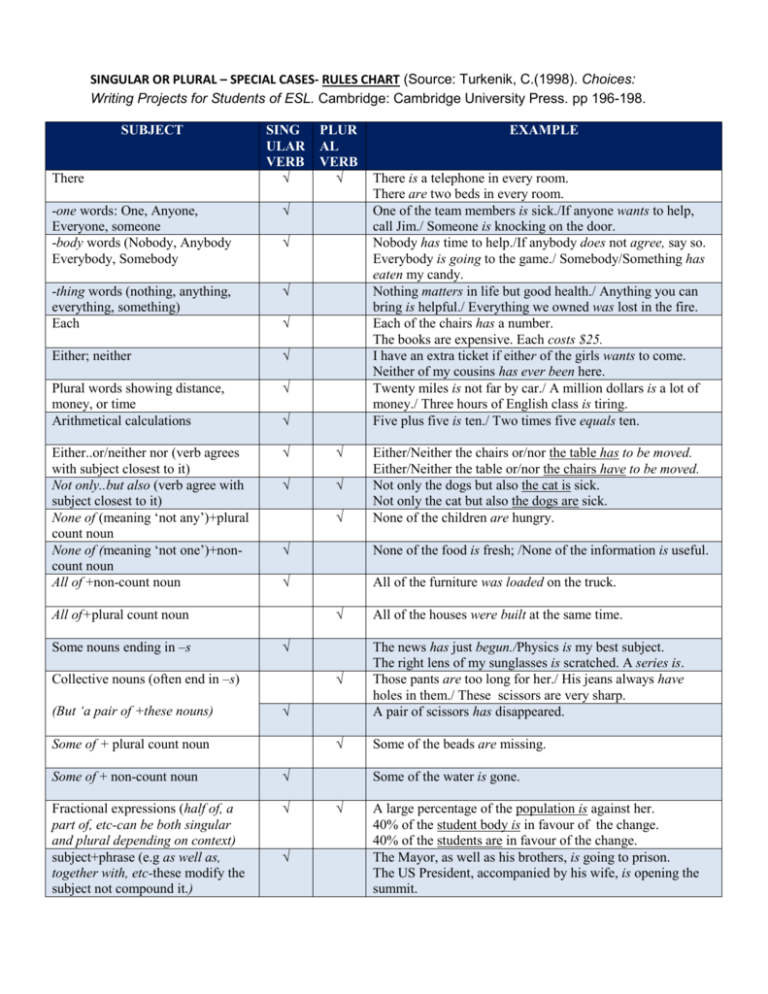
SINGULAR OR PLURAL – SPECIAL CASES- RULES CHART (Source: Turkenik, C.(1998). Choices: Writing Projects for Students of ESL. Cambridge: Cambridge University Press. pp 196-198. SUBJECT There SING ULAR VERB √ PLUR AL VERB √ -one words: One, Anyone, Everyone, someone -body words (Nobody, Anybody Everybody, Somebody √ -thing words (nothing, anything, everything, something) Each √ Either; neither √ Plural words showing distance, money, or time Arithmetical calculations √ Either..or/neither nor (verb agrees with subject closest to it) Not only..but also (verb agree with subject closest to it) None of (meaning ‘not any’)+plural count noun None of (meaning ‘not one’)+noncount noun All of +non-count noun √ √ √ √ √ √ √ √ Either/Neither the chairs or/nor the table has to be moved. Either/Neither the table or/nor the chairs have to be moved. Not only the dogs but also the cat is sick. Not only the cat but also the dogs are sick. None of the children are hungry. None of the food is fresh; /None of the information is useful. √ All of the furniture was loaded on the truck. √ All of the houses were built at the same time. √ The news has just begun./Physics is my best subject. The right lens of my sunglasses is scratched. A series is. Those pants are too long for her./ His jeans always have holes in them./ These scissors are very sharp. A pair of scissors has disappeared. √ Some of the beads are missing. √ Collective nouns (often end in –s) (But ‘a pair of +these nouns) There is a telephone in every room. There are two beds in every room. One of the team members is sick./If anyone wants to help, call Jim./ Someone is knocking on the door. Nobody has time to help./If anybody does not agree, say so. Everybody is going to the game./ Somebody/Something has eaten my candy. Nothing matters in life but good health./ Anything you can bring is helpful./ Everything we owned was lost in the fire. Each of the chairs has a number. The books are expensive. Each costs $25. I have an extra ticket if either of the girls wants to come. Neither of my cousins has ever been here. Twenty miles is not far by car./ A million dollars is a lot of money./ Three hours of English class is tiring. Five plus five is ten./ Two times five equals ten. √ All of+plural count noun Some nouns ending in –s EXAMPLE √ Some of + plural count noun Some of + non-count noun √ Fractional expressions (half of, a part of, etc-can be both singular and plural depending on context) subject+phrase (e.g as well as, together with, etc-these modify the subject not compound it.) √ √ Some of the water is gone. √ A large percentage of the population is against her. 40% of the student body is in favour of the change. 40% of the students are in favour of the change. The Mayor, as well as his brothers, is going to prison. The US President, accompanied by his wife, is opening the summit. All of+plural count noun Some nouns ending in –s All of the houses were built at the same time. √ The news has just begun./Physics is my best subject. The right lens of my sunglasses is scratched. A series is. Those pants are too long for her./ His jeans always have holes in them./ These scissors are very sharp. A pair of scissors has disappeared. √ Collective nouns (often end in – s) √ (But ‘a pair of +these nouns) √ √ Some of + plural count noun Some of + non-count noun √ Fractional expressions (half of, a part of, etc-can be both singular and plural depending on context) subject+phrase (e.g as well as, together with, etc-these modify the subject not compound it.) √ √ Some of the beads are missing. Some of the water is gone. √ A large percentage of the population is against her. 40% of the student body is in favour of the change. 40% of the students are in favour of the change. The Mayor, as well as his brothers, is going to prison. The US President, accompanied by his wife, is opening the summit.

